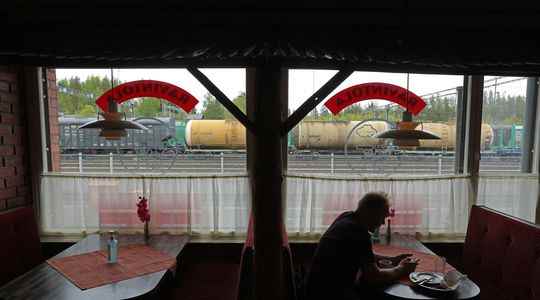The international community welcomes this. With the agreement of the two countries involved in this war, the nuclear power plant in Zaporizhia should be subject to an inspection by the International Atomic Energy Agency (IAEA) on Thursday. The thirteen members of the team chosen for this mission arrived on Wednesday 31 August. “Unfortunately Russia does not stop its provocations, precisely in the directions by which the mission must arrive at the plant”, lamented the Ukrainian President Volodymyr Zelensky, adding that the situation was “extremely threatening. At the same time, Russia cuts to gas to Europeans again, and the European Union has agreed to limit Russian tourism on its territory, a controversial measure.
The inspection mission of the International Atomic Energy Agency (IAEA) arrived in the city of Zaporizhia, in southern Ukraine, en route to the nuclear power plant of the same name, occupied by Russian troops, noted AFP journalists. The convoy of around 20 cars, half of which marked “UN” (UN), and an ambulance, entered the city early Wednesday afternoon. Zaporizhia is some 120 kilometers from this power station, the largest in Europe. The mission will have access to the plant this Thursday. kyiv has accused Moscow of deploying hundreds of troops there and stockpiling ammunition there. Russia accuses Ukraine of targeting the building.
“I am fully aware of the importance of this moment but we are ready. The IAEA is ready. We will report after our mission. We will spend a few days there,” added Rafael Grossi. Ukrainian President Volodymyr Zelensky had received on Tuesday IAEA experts, who had arrived in kyiv the day before, calling for “immediate demilitarization” of the plant meaning the withdrawal of Russian soldiers from the radioactive site. A visit that does not stop the bombs: this Wednesday, Russians and Ukrainians still accused each other of shooting, in the vicinity of the power plant.
- The EU begins to tighten visa access conditions for Russians
Persona non grata, the average Russian? The foreign ministers of the European Union decided on Wednesday to suspend the agreement currently in force with Russia, which until now allowed to relax visa conditions. This suspension should make obtaining visas for Russian citizens more difficult and longer, according to the head of European diplomacy.
According to Josep Borrell, the ministers meeting in Prague agreed that relations with Moscow “could not remain unchanged” and that the agreement should be “completely suspended”. If the measure could represent a strong signal, some specialists are worried about undesirable effects: cutting the Russians off from Europe could reinforce their prejudices on the Old Continent.
- Nord Stream: gas deliveries suspended
The Russian giant Gazprom announced on Wednesday morning that it had “entirely” suspended its gas deliveries to Europe via the Nord Stream gas pipeline due to maintenance work which should last three days. This work is “planned on a gas compressor station has started”, said the Russian group in a press release published on its Telegram account.
The day before, the giant Gazprom had announced that it was going to completely suspend its gas deliveries to the French group Engie from Thursday due to the latter’s non-payment for all deliveries made in July. Under a decree by Russian President Vladimir Putin signed at the end of March, Gazprom specifies that “it is prohibited to deliver more natural gas to a foreign buyer if the buyer has not made payment in full within the set period. in the contract”. However, Gazprom affirms not to have received Tuesday at the end of the day the entirety of the sums due for the deliveries of July. On his side, Elisabeth Borne wanted to be reassuring regarding French supplies and the country’s ability to heat itself this winter.
- Fighting in the South, in the Kharkiv region and in the Donbass
The Ukrainian army continues its counter-offensive in the south where intense fighting is taking place. They are taking place practically on the entire front line: “in the south, in the Kharkiv region (northeast) and in the Donbass (east),” President Zelensky said on Tuesday evening. In Bereznehuvate, a locality 70 km north of Kherson, a southern city taken by the Russians at the start of the war, AFP witnessed a constant passage of Ukrainian armored vehicles, while numerous artillery fire echoed in the surroundings.
Russia rather evokes, in this region, “offensive attempts”. The country’s defense ministry claimed the death of 1,200 Ukrainian soldiers “in one day”, as well as the disabling of dozens of military vehicles. The information advanced by the Russian dignitaries remains unverifiable. Taking the prospect seriously, defense ministers from European Union member states agreed Tuesday, during an informal meeting in Prague, to begin preparatory work for a training plan for Ukrainian soldiers.
- Mikhail Gorbachev, last leader of the USSR, is dead
After a long illness, the man who led the USSR between 1985 and 1991 died on Tuesday August 30. In particular, he launched an economic, cultural and political liberalization known as “perestroika”. In August 1991, Mikhail Gorbachev overcame a putsch led by the hard wing of the Soviet regime before handing over power four months later. He took note of the dismemberment of the USSR by presenting his resignation from the presidency. He gave way to his rival Boris Yeltsin.
In 2011, he gave L’Express an interview in which he returned to Vladimir Putin, the oligarchs, corruption and human rights abuses in his country and retains a very special value in these troubled times.
